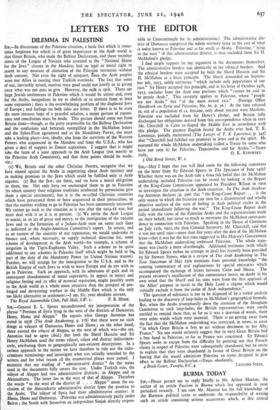Snt,—May I hope that you will find room for the
following comments on the letter from Sir Edward Spears in The Spectator of June 14th? Whether there was on the Arab side a bona fide belief that the McMahon undertaking included Palestine can be tested by looking at the Report of the King-Crane Commission appointed by President Wilson in 1919 to investigate the situation in the Arab countries. In The Arab Awaken- ing Antonius declares (p. 296) that " the King-Crane Report .. . is the only source to which the historian can turn for a disinterested and wholly objective analysis of the state of feeling in Arab political. circles in the period immediately following the war." The King-Crane Report deals fully with the views of the Palestine Arabs and the representations made on their behalf, but never so much as mentions the McMahon correspon- dence in connection with Palestine. Speaking in the House of Commons on July nth, 1922, the then Colonial Secretary, Mr. Churchill, said that it was not until 1921—more than five years after the date of the McMahon letter—that it was for the first time suggested to His Majesty's Government that the McMahon undertaking embraced Palestine. The whole argu- ment was clearly a mere afterthought. Additional testimony (with which. Sir Edward Spears makes no attempt to deal) has recently been provided by Sir Stewart Symes, who in a review of The Arab Awakening in The New Statesman of May 25th mentions from personal knowledge-" the running commentary of oral explanations by special emissaries which accompanied the exchange of letters between Cairo and Mecca. The present reviewer's recollection of this commentary leaves no doubt in his own mind that the Sharif and his sons were from the first apprised of. the Allies' purpose to instal in the Holy Land a regime which would virtually exclude it from the realm of Arab independence."
The question of substance is not to be disposed of by a verbal analysis leading to the discovery of loop-holes in McMahon's geographical formula. But, when the Arabs triumphantly drew the attention of the Maugham Committee to such loop-holes, the British representatives were surely entitled to remind them that, so far as it was a question of words, there were other words which were material. There is no getting away from the fact that the McMahon undertaking was restricted, in terms, to areas " in which Great Britain is free to act without detriment to her Ally, France." No one would seriously suggest that in 1915 Great Britain had a free hand in Palestine, so far as France was concerned. Sir Edward Spears seeks to escape from the difficulty by pointing out that French claims in respect of Palestine were subsequently abandoned, but he omits to explain that they were abandoned in favour of Great Britain on the footing that she would administer Palestine on terms designed to give effect to the Balfour Declaration.—Yours obediently, 4 Brick Court, Temple, E.C. 4. LEONARD STEIN.


























 Previous page
Previous page